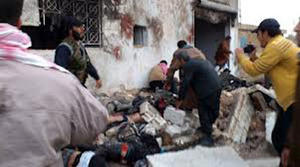SyriaMcCain: military aid to rebels, no-fly zone necessary as Assad gaining “upper hand”
Senator John McCain (R-Arizona) said it is “ludicrous” to believe that Syrian president Bashar al-Assad would negotiate a diplomatic solution to the county’s civil war at an upcoming summit. McCain says that providing military aid to the anti-Assad rebels and imposing a no-fly zone over Syria would more likely yield results than a summit meeting in Geneva.

Aftermath of Syrian government air attack on rebels // Source: dangcongsan.vn
Senator John McCain (R-Arizona) said it is “ludicrous” to believe that Syrian president Bashar al-Assad would negotiate a diplomatic solution to the county’s civil war at an upcoming summit.
“Anyone that believes that Bashar Assad is going to go to a conference in Geneva when he is prevailing on the battlefield, it’s just ludicrous to assume that,” McCain said Sunday on CBS’s Face the Nation (see video here).
On Sunday eight days ago, McCain, who was in the Middle East on a previously planned trip, paid a surprise visit to leaders of the Syrian rebellion, meeting some of them in a Turkish border town, and others in a town inside Syria.t
The Hill reports that McCain, who has been one of the leading voices calling for the United States and its European allies to provide military aid to the rebels, said the meeting has convinced him that the rebels would be a reliable ally and that failing them could lead to a humanitarian crisis.
“They’re very dedicated. They are not al Qaeda, they are not extremists,” McCain said.
McCain said he does not believe sending American troops to Syria is the answer, but said the United States should establish a no-fly zone over Syria to prevent the Assad regime from using its air superiority in the fight against the rebels.
“We need to give them [the rebels] a no-fly zone,” McCain stated. “The Israelis have shown us we can take out their [the Syrians’] facilities from a distance, that we don’t have to risk our pilots. We can crater their runways, we can take out their air assets, we can provide them [the rebels] with a safe zone so that the Syrian opposition council outside Syria can come into Syria and coordinate” [by “from a distance” McCain refers to the fact that the Israel Air Force (IAF) used stand-off weapons, launched from aircraft flying over Lebanon or the Mediterranean Sea, to destroy targets inside Syria on three recent attacks – 30 January, 4 May, and 6 May].
The Obama administration and European countries have been reluctant to provide lethal aid to the rebels because some of the rebel militias are Islamist fundamentalists, and one – Jabhat al-Nusra – is affiliated with Al Qaeda in Iraq.
The White House instead has been pushing for a diplomatic solution through a summit meeting in Geneva, which will include representatives of the rebels and the Assad regime.
The rebels are divided on whether or not to insist on their earlier precondition for such a summit – that Assad leave power before the sides meet. In addition, the Assad regime’s military has been bolstered by the recent infusion of or about 2,500 Hezbollah fighters, and the addition of Iranian Republican Guard officers in command position down to the brigade level. The results have been evident in the field, where the regime forces have been performing better.
Analysts note that Assad now has less of an incentive to make significant concessions, especially since Russia has committed itself publicly to selling sophisticated S-300 air defense missiles to Syria, in addition to ten new fighter jets.
McCain said he has spoken to Secretary of State John Kerry about the summit, but has not spoken to President Obama.
“Hopefully we’ll go to the floor [of the Senate], but the administration knows this,” McCain said. “They have the same information I have, it’s a slaughter and the refugee camps are full.”
